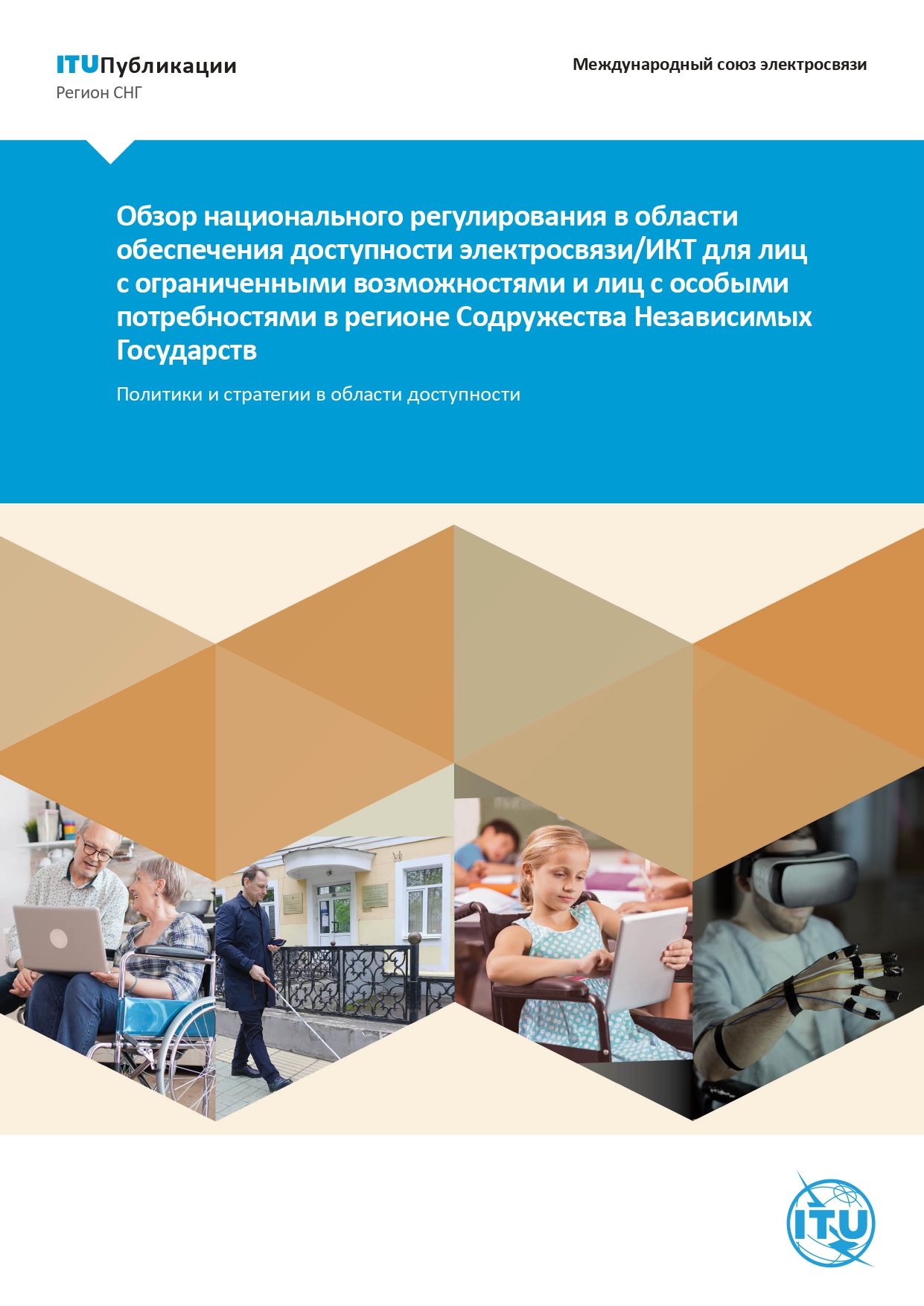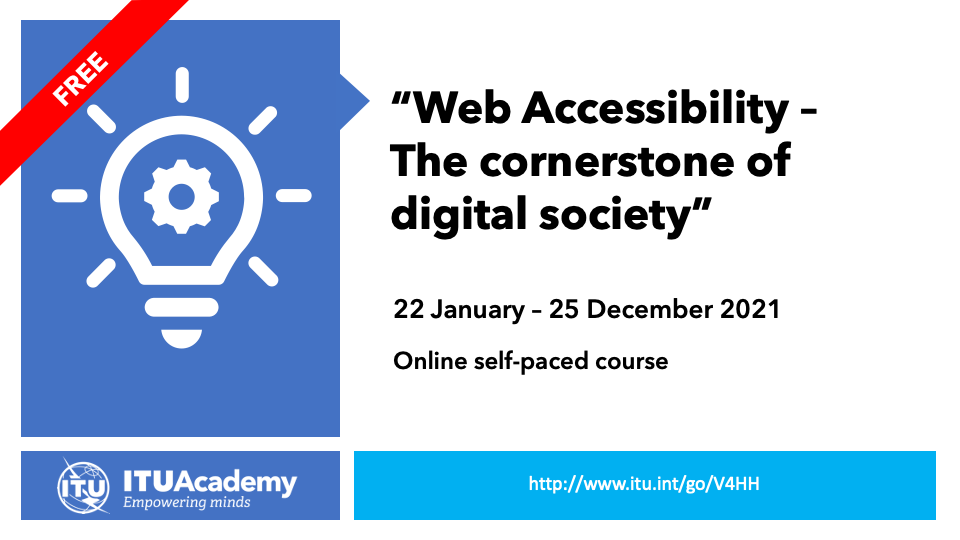4 November 2021
Social inclusion and equal opportunities for people with disabilities is one of the priorities of the Sustainable Development Goals. The health and well-being of each person depends on the degree of integration into society, on decent-paying work, the opportunity to receive quality education and qualified medical care, but these are precisely the areas of life in which people with disabilities are especially vulnerable. Often, “disabilities" are a consequence of the barriers people with disabilities face in areas such as health, education, employment and transportation, and access to information and communication. At the Regional Preparatory Meeting for the World Telecommunication Development Conference for CIS Region (21 to 22 April 2021 ), a draft Regional Initiative for the CIS Region for the period 2022-2025 on “Digital skills and ICT accessibility for the population, in particular for persons with disabilities" was proposed. It aims to provide assistance to regional ITU Member States in formulating recommendations for the development of citizens' digital skills, paying particular attention to persons with disabilities. There is a high demand for research in this area because of the active work of the CIS Region countries on the growth of ICT accessibility for people with disabilities and special needs. In this regard, from March to August 2021, a new study was carried out to assess the level of digital inclusion of people with disabilities as well as the progress in creating an enabling and inclusive environment that makes telecommunications / ICTs accessible for people with disabilities and people with special needs in the region.

A result of the study was an assessment of current progress in telecommunication / ICT accessibility laws, regulations, policies and strategies in the region. The CIS countries actively participated in the preparation of the regional assessment, providing updated information in response to the questionnaire “ICT accessibility policy and regulatory framework overview in the CIS region".
The regional assessment showed that the countries of the CIS Region, expressing their commitment to the principles laid down in the UN Convention on the Rights of Persons with Disabilities, contribute to the UN efforts to implement it and take a set of measures aimed at creating a legally enabling environment for ensuring ICT accessibility. In particular, policy frameworks and tools are being developed to integrate inclusive ICTs, as well as appropriate innovative solutions to combat social exclusion, discrimination and poverty. Awareness of people with disabilities about their rights and available solutions and services is increasing. Significant attention is paid to improving the professional skills of information, media, education and ICT in the development and using of inclusive technologies, accessible content and services. The full text of the ITU report “ICT accessibility policy and regulatory framework overview in the CIS region" can be found here. The executive summary of the report in English is also available. Along with the report, the online certificate based self-paced training courses, “Web Accessibility - The cornerstone of digital society" and “ICT Accessibility - The key to inclusive communication", previously developed by the ITU-D Digital Inclusion team, were successfully localized for Russian-speaking users by ITU Regional Office for the CIS Region. These courses are not only aimed at increasing accessibility in CIS region but are also accessible for persons with disabilities. They were developed using the Articulate Storyline software in HTML5. The courses are compatible with the JAWS, NVDA, VoiceOver and TalkBack screen readers used with Internet Explorer, Edge, Chrome, Firefox and Safari. Each module of the online courses is an independent block, consisting of the main content and quizzes. The student's progress is monitored by the Learning Management System (LMS) and an ITU certificate validates the knowledge achieved upon successfully completing the course. Online course “Web Accessibility - The cornerstone of digital society" is composed of 3 modules: - Module 1: Executive tools for developing a web accessibility policy - Module 2: Essentials of implementing a web accessibility evaluation - Module 3: Technical skills for designing and developing accessible websites. The learner will develop an overall understanding of the main issues relating to web accessibility, including: web accessibility policy development, the creation of accessible digital content, the evaluation of level of accessibility of the websites, principles related to the design and development of accessible websites and maintenance of accessible websites, in line with the international standards related to web accessibility.

An excellent example of the practical implementation of the principles of the accessible web resources design is “Recommendations for ensuring the accessibility of web content" which were developed in September 2021 by “IT-Academy" LLC of Uzbekistan with the support of the ITU Regional Office for the CIS Region and the Association of Disabled Persons of Uzbekistan. These Recommendations can be used to improve the accessibility of websites of government agencies, businesses, social services, universities and other organizations and are aimed at creating inclusiveness of web content for a wide range of users. In the near future, two government portals of Uzbekistan - "epark.uz" and "uzbekcoders.uz" - will be improved in accordance with the developed “Recommendations for ensuring the accessibility of web content''. Online course “ICT Accessibility - The key to inclusive communication" is also composed of 3 modules: Module 1: Enabling communication for all through ICT Accessibility Module 2: ICT Accessibility policy regulations and standards Module 3: Achieving ICT accessibility through public procurement The course's modules aim to increase student`s awareness on the accessibility functions of basic ICTs, for example, mobile phones, computers, mobile devices, etc.; improve an understanding of the benefits of the functions of accessibility of basic ICTs for people; an understanding of global mechanisms and the digital inclusion agenda; as well as international and regional regulatory documents in the field of ICT accessibility, public procurement practices of accessible ICTs and many others.

For more information on other publications and developments of the ITU-D in the area of digital accessibility, please follow the link.
|